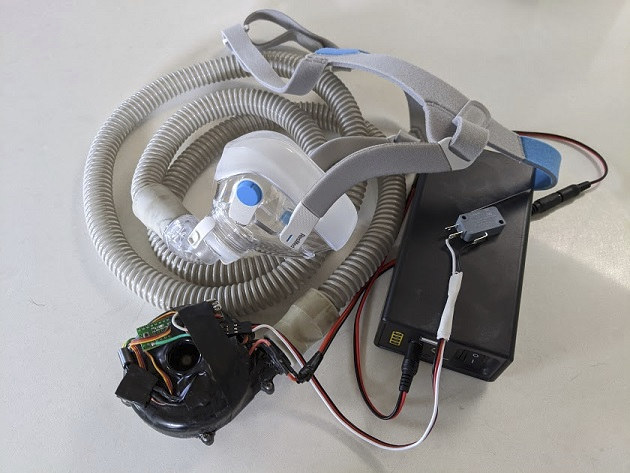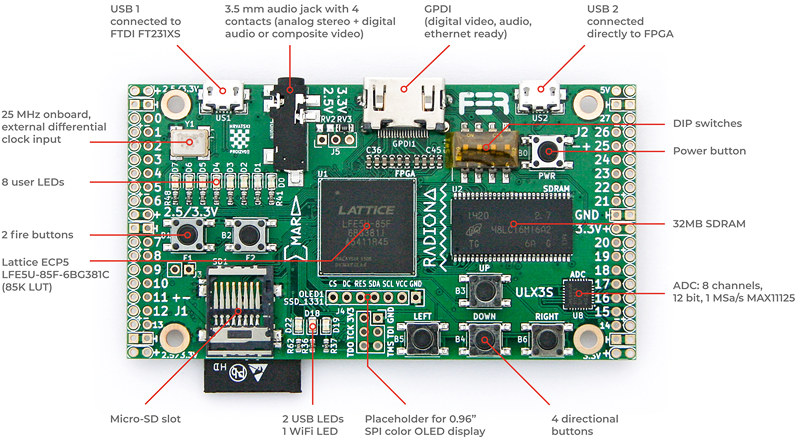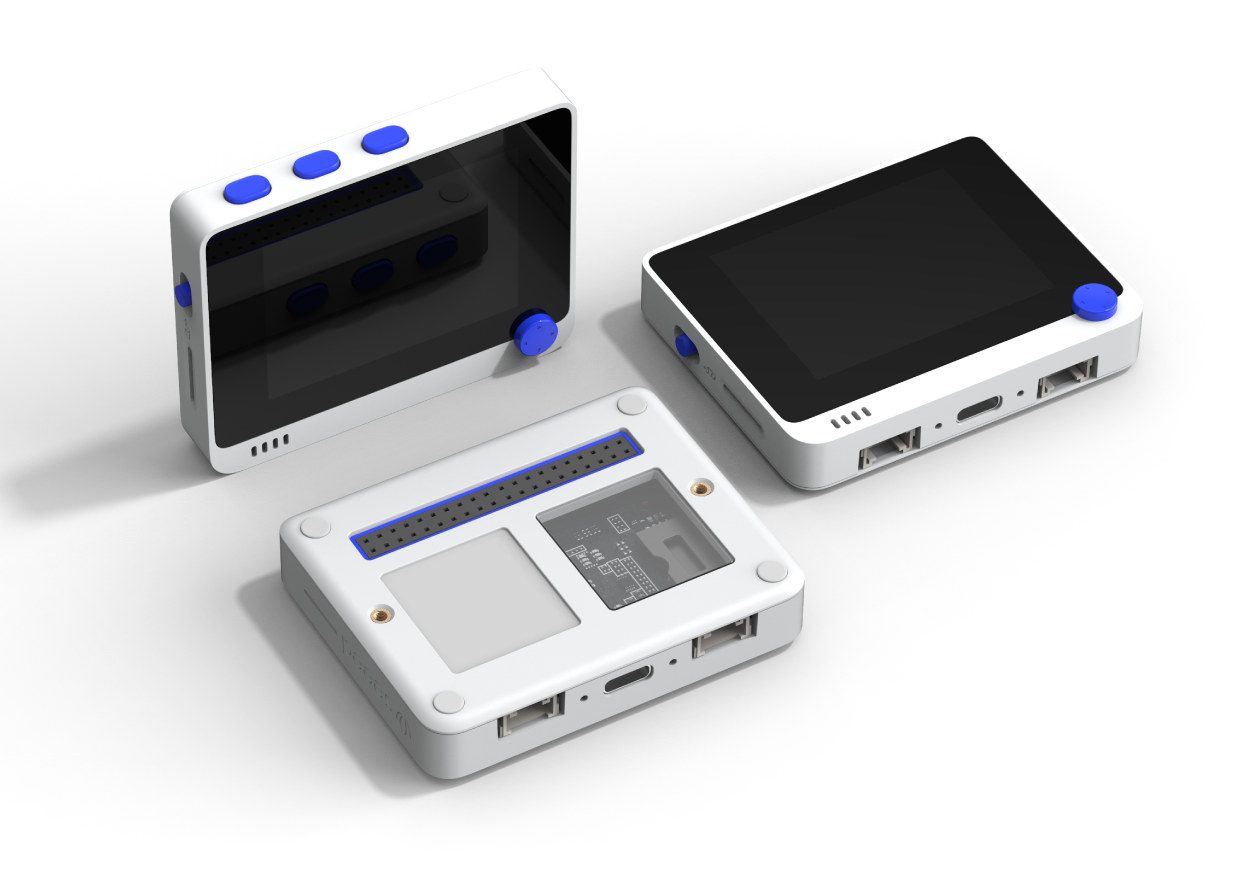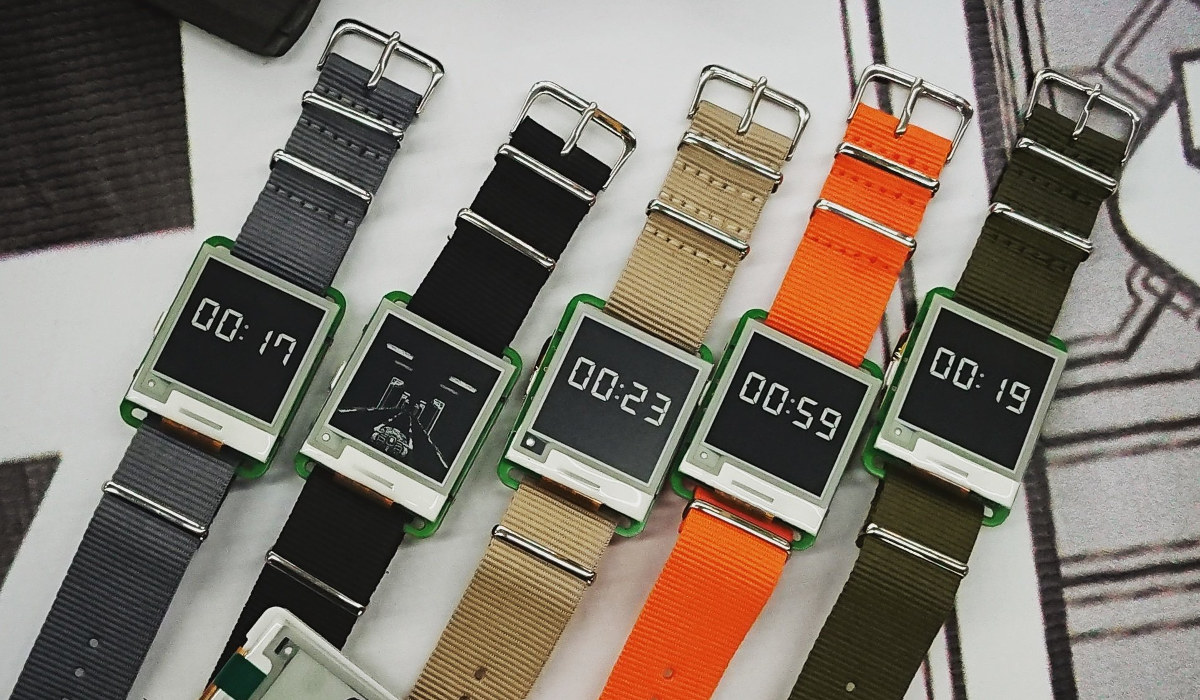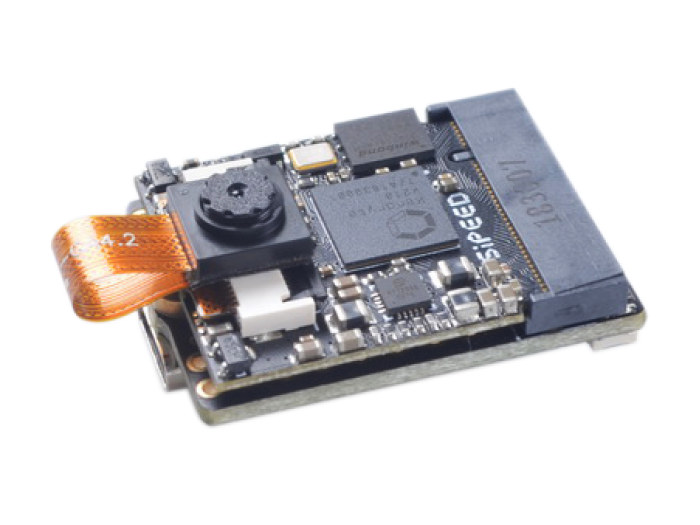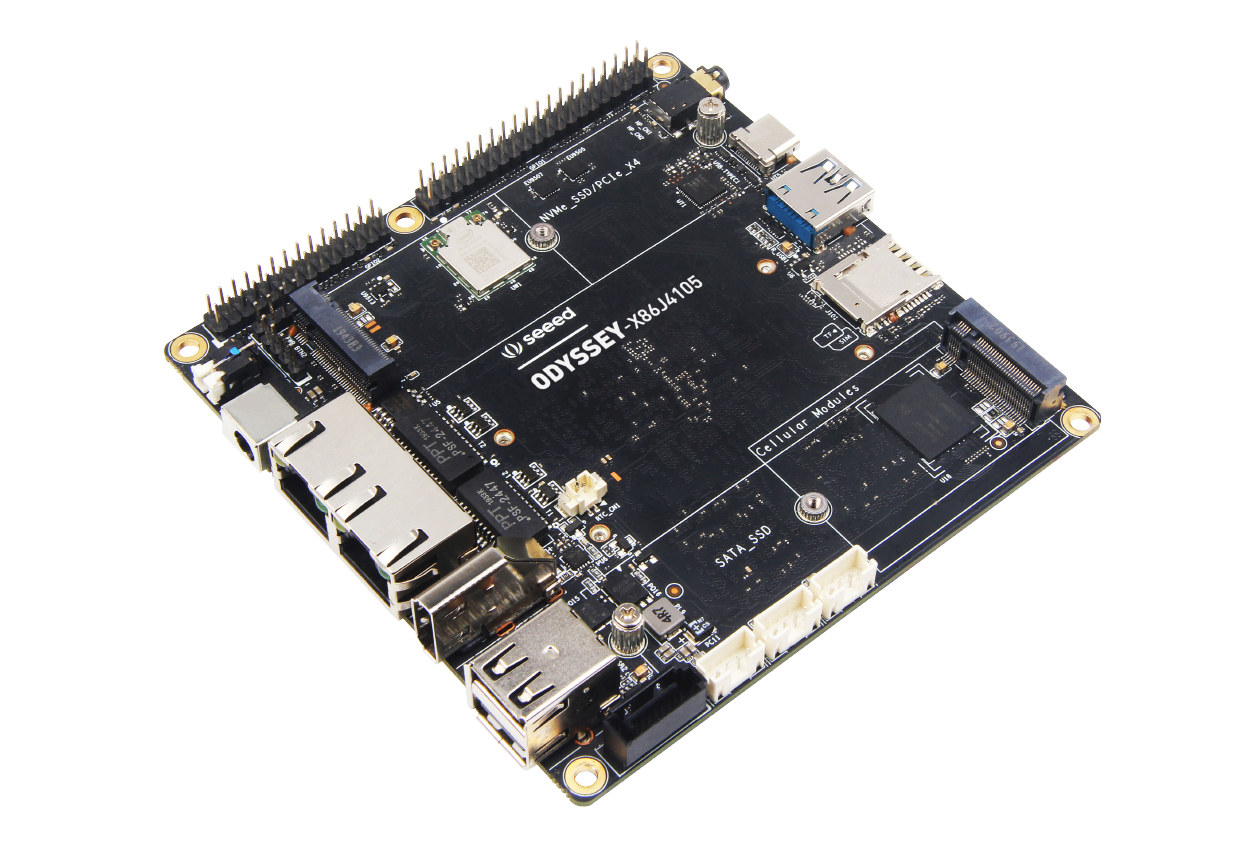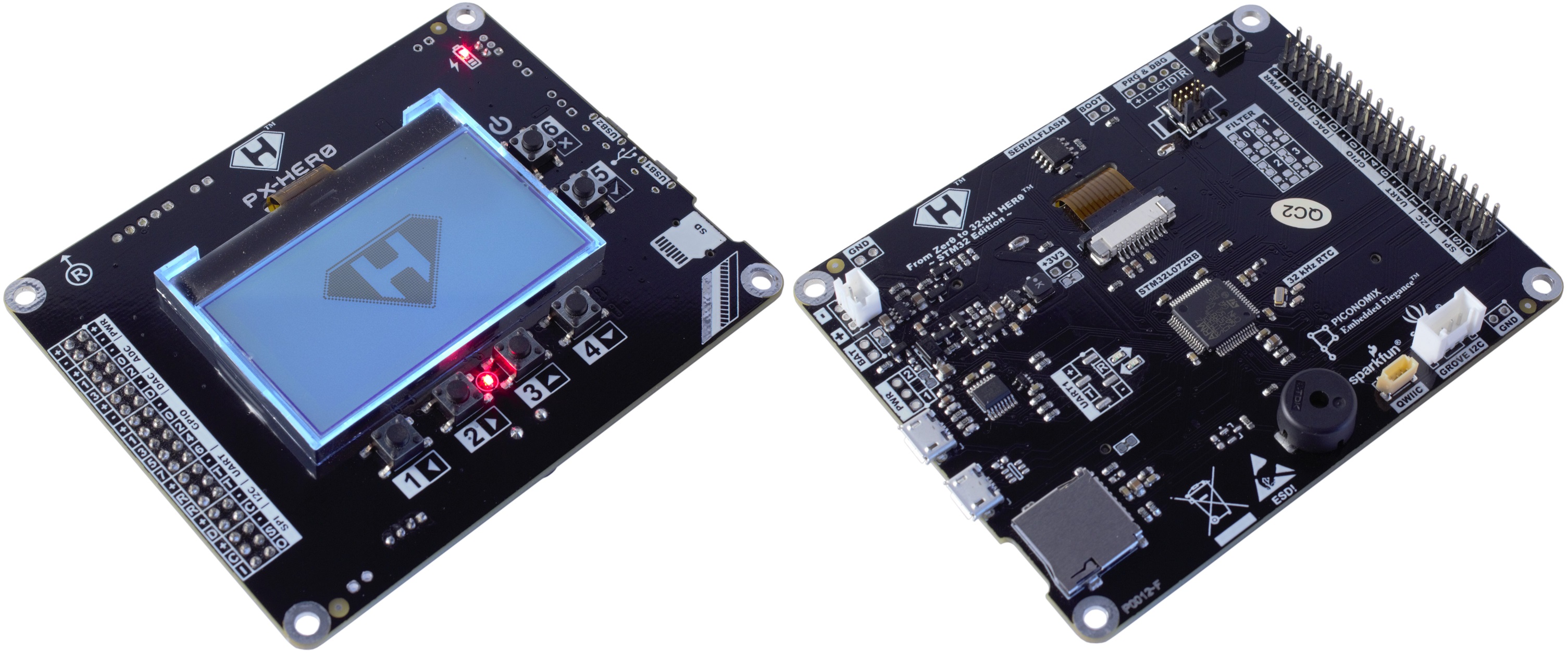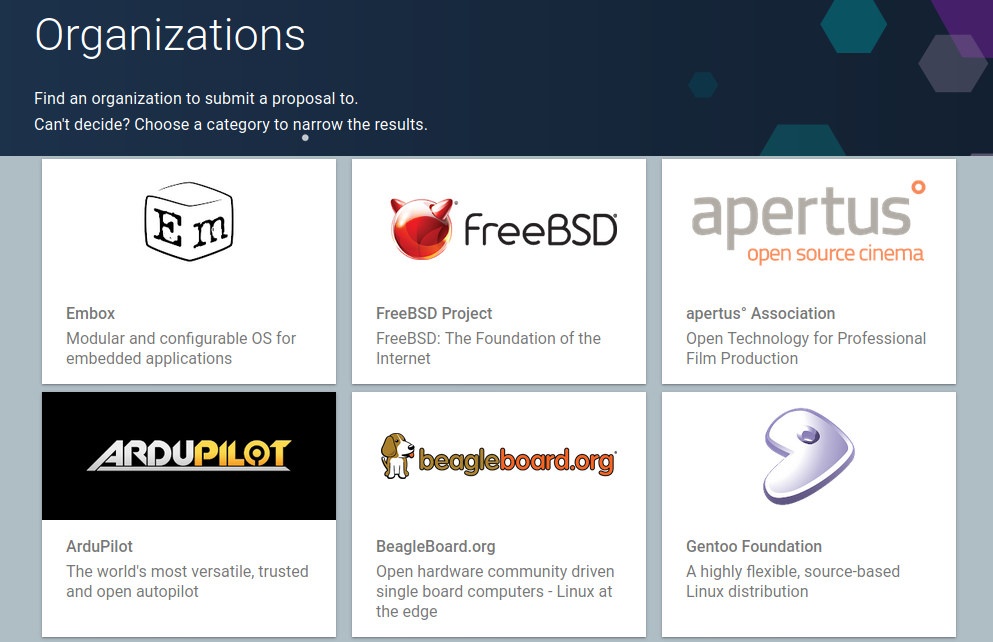COVID-19 has disrupted most people lives well beyond the health crisis, with an economic fallout on-going that may lead to a 24% GDP contraction in the US and up to 12% worldwide in Q2 2020, and I assume the consequences may span over several years, so we should do everything to mitigate any effects from the disease. Right now, the urgent part is to handle the health crisis, and there’s a shortage – or soon will be – of medical supplies such as ventilators for people in critical conditions, and if hospitals become full they’ll start refusing admissions of some people even in critical conditions, as it happened in Wuhan, letting people die at home. So there are various initiatives and projects to develop open-source ventilators. First, Innovation Management reports Ennomotive has launched a non-profit online competition for the ideation of low-cost, easy-to-build solutions with the goal of speeding up […]
Radiona ULX3S Open Source Hardware ECP5 FPGA Development Board Launched for $99 and Up (Crowdfunding)
Last summer, we wrote about Radiona ULX3S education board combining a Lattice Semi ECP5 FPGA with an Espressif Systems ESP32 WiFi & Bluetooth WiSoC. Designed for a digital logic course at the University of Zagreb, the board is open-source hardware with KiCAD hardware design files released on GitHub, and programmable with the Arduino IDE (FPGArduino) and ProjectTrellis open-source toolchain. At the time, there was only a version based on Lattice ECP5 85F with 84K LUT, but they’ve now made versions with cheaper variants of ECP5 FPGA and launched the board on Crowd Supply. Radiona ULX3S specifications: FPGA (one of the other) Lattice ECP5 LFE5U-85F-6BG381C with 84K LUT Lattice ECP5 LFE5U-45F-6BG381C with 44K LUT Lattice ECP5 LFE5U-12F-6BG381C with 12K LUT System Memory – 32MB SDRAM @ 166 MHz Storage – 4–16MB Quad-SPI Flash for FPGA config and user data storage; MicroSD slot Audio – 3.5 mm jack with 4 contacts (analog […]
Wio Terminal Features Microchip SAMD51 MCU, Dual-Band WiFI & Bluetooth WiFI, and 2.4″ LCD
Microchip SAM D5x Arm Cortex-M4 microcontrollers were introduced in 2017, and the next year we started to see Arduino or MicroPython compatible board brought to market including Adafruit Metro M4 or Tachyon boards. Seeed Studio has now introduced its own Arduino & MicroPython compatible SAMD51 platform with Wio Terminal also integrating an RTL8720DN dual-band WiFi 4 and Bluetooth 5.0 chip, and 2.4″ LCD display. There are also Grove connectors to add sensor modules, and a 40-pin header to use the device like a Raspberry Pi HAT. Wio Terminal features and specifications: MCU – Microchip SAMD51 (ATSAMD51P19) Arm Cortex-M4F microcontroller @ 120 MHz (can be overclocked to 200 MHz) with 192KB RAM, 512KB flash Storage – 4MB external SPI flash, MicroSD card slot up to 16GB Display – 2.4″ LCD screen with 320×240 resolution (ILI9341 driver) Audio – Microphone and buzzer Connectivity – Dual-band WiFi 4 802.11b/g/n and Bluetooth 5.0 via […]
$55 Watchy Smartwatch Combines ESP32 WiFi & Bluetooth SoC with E-ink Display
SQFMI has designed a (mostly) open-source hardware smartwatch based on an ESP32-S wireless module for WiFI and Bluetooth connectivity, and equipped with an E-ink display of 200×200 resolution. Watchy also comes with a BMA423 accelerometer, four buttons, a DS3231 real-time clock, and a vibration motor. The watch should last around 2 weeks on a charge. I mentioned the watch is “mostly” open source hardware because while the GERBER files, bill of materials (BoM) and the PDF schematics have been released on Github, the KiCAD schematics and PCB layout files have not so far. That still means you can understand the design, repair the design, or even make your own, but if you intended in modifying the design, you’d have some more work to do. Tom Fleet, writing for Hackster.io, does go through different sections of the schematics and explain what they do. One the software side, the watch can be […]
Sipeed M1n is a $10 M.2 Module based on K210 RISC-V AI Processor
Kendryte K210 is a RISC-V processor with AI accelerator found in boards such as Maixduino, Grove AI HAT, or HuskyLens among others, and enabling low-cost, low power AI applications such as face detection or object recognition. You can now add Kendryte K210 AI accelerator to any board or computer with M.2 socket or [Update: the M.2 connector pinout is non-standard] a USB-C port thanks to Sipeed M1n M.2 module that also comes with an M.2 to USB-C adapter. Sipeed M1n specifications: SoC – Kendryte K210 dual-core 64-bit RISC-V processor @ up to 400MHz with FPU, Neural-network Processing Unit (NPU), audio processor, built-in 6MB SRAM memory for CPU, and 2MB AI SRAM Storage – 128Mbit SPI flash Camera – 24-pin connector for DVP camera (OV0328 camera module provided as part of the kit) Host Interface – M.2 socket with some IOs and JTAG interface, accessible via Maix Nano M.2 to USB-C […]
ODYSSEY-X86J4105800 SBC Combines Intel Gemini Lake SoC and Arduino Compatible MCU
Would it be good to have an all-in-one Windows platform used to both develop Arduino code and run that code to control I/O of your project? Or alternatively, have a single board computer capable of video processing and real-time I/Os? That platform already exists. UDOO X86 II SBC features an Intel Braswell processor combined with an Arduino Leonardo compatible Microchip ATmega32U4 MCU. But there’s now another, more powerful option courtesy of Seeed Studio with the oddly named ODYSSEY-X86J4105800 SBC equipped with an Intel Celeron J4105 quad-core Gemini Lake processor to run Windows 10 or Linux distributions, and a Microchip SAMD21 ARM Cortex-M0+ microcontroller compatible with Arduino Zero. ODYSSEY-X86J4105800 SBC specifications: SoC – Intel Celeron J4105 quad-core processor @ 1.5/2.5 GHz (Turbo) with 12EU Intel UHD Graphics 600 @ 250-750 MHz; 10W TDP System Memory – 8GB LPDDR4 RAM Storage Optional 64GB eMMC flash (fitted to ODYSSEY-X86J4105864 model), 1x SATA III data […]
PX-HER0 ARM Cortex-M0 Development Board and Ecosystem is for Beginners and Veterans (Crowdfunding)
PX-HER0 ARM Cortex Development Board and Ecosystem Piconomix is offering an embedded Arm Cortex-M0 development board that is aimed at the education, beginner maker, and enthusiast crowd. The PX-HER0 is a development board with an ecosystem of sourcing materials for learning the entire ARM structure through an open-source C library and full documentation. The Basics of the Board The PX-HER0 is a low-power board, running an STM32 MCU with an Arm Cortex-M0 core. There is an LCD Display, that is viewable even in direct sunlight, and the entire package is lightweight and very functional. Mass Storage To activate the bootloader, a double-tap of the RESET button, and the mass storage drive HERO-BOOT appears in the host computer. Drag and Drop are active and the UF2 file can be dragged right to the drive. The Ecosystem The ecosystem for the PX-HER0 is backed by an extensive C Library and documentation […]
Google Summer of Code 2020 Mentoring Organizations Announced
Every year Google organizes the Summer of Code inviting students to work on open-source projects and even get paid for it. The company first select mentoring organizations, before accepting applications from students. Google has now announced the 200 organizations/projects that have been selected for Summer of Code 2020. Many projects are higher-level software development such as web development or desktop programs development but there are also projects closer to the hardware-side of things with operating systems and multimedia projects. Some interesting organization and/or projects part of the audio / graphics / video / multimedia category include: apertus Association developing AXIOM open-source hardware camera FFmpeg multimedia framework to decode, encode, transcode, de/mux, stream, filter & play audio and video stream found in many projects OpenCV Open Source Computer Vision Library for computer vision and deep learning applications. XOrg foundation for X Window System and related projects such as Mesa, DRI, Wayland, […]


